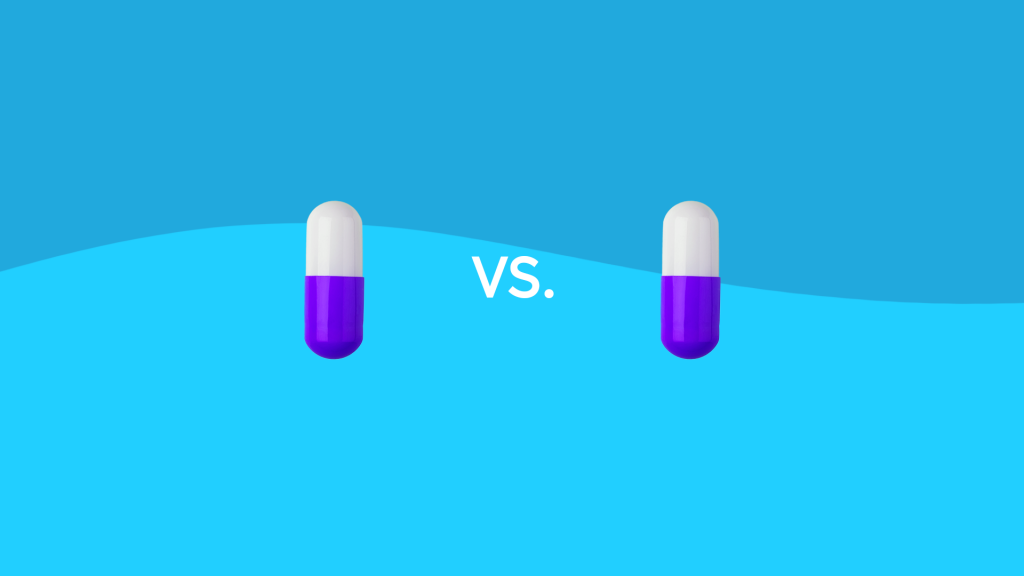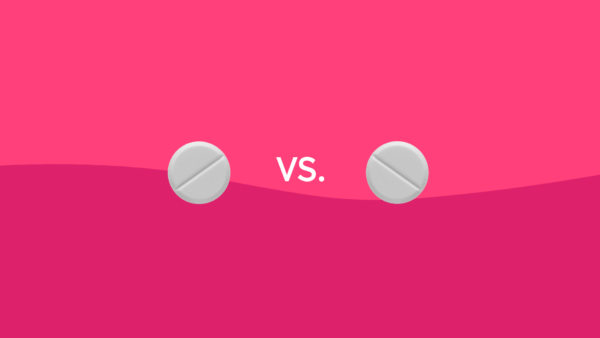Main differences | Conditions treated | Efficacy | Coverage and cost comparison | Side effects | Interactions | Warnings | FAQs
Phendimetrazine and phentermine are prescription weight-loss medications that work in similar ways. They are generally prescribed to individuals who are obese or overweight with certain risk factors, such as high blood pressure, diabetes, or high cholesterol.
Both phendimetrazine and phentermine are generic medications that are only available with a prescription. They are mainly classified as anorectics or appetite suppressants, sympathomimetic amines, and stimulants. Both phendimetrazine and phentermine are only recommended for a short duration with an appropriate diet and exercise plan. Because they are chemically similar to amphetamines, phendimetrazine and phentermine are controlled substances that carry a risk of abuse.
Continue reading to learn about the similarities and differences between phendimetrazine and phentermine, including their effectiveness, safety, and costs.
What are the main differences between phendimetrazine and phentermine?
The main differences between phendimetrazine and phentermine are in their available forms, dosages, and restrictions.
Dosages
Phendimetrazine, also known as phendimetrazine tartrate, is available as a 35 mg tablet and 105 mg extended-release capsule. The usual dosage of phendimetrazine is a 35 mg tablet two to three times daily one hour before meals or a 105 mg extended-release capsule once in the morning 30 minutes to an hour before breakfast.
Phentermine is available as a regular oral tablet, capsule, extended-release capsule, and orally disintegrating tablet. Phentermine is available in strengths ranging from 15 to 37.5 mg, depending on the dosage form. There are also 8 mg tablets available under the brand name Lomaira, which can be taken up to three times daily 30 minutes before meals. The usual phentermine dosage is a 37.5 mg tablet one to two hours before breakfast.
Controlled substance schedules
Another key difference between phendimetrazine and phentermine is their classification as controlled substances. Phendimetrazine is classified as a Schedule III controlled substance, while phentermine is classified as a Schedule IV controlled substance. This means that phendimetrazine has a higher potential for abuse and dependence than phentermine.
Age limits
There are slight differences in the age limits for each drug. Both drugs may be prescribed for people with obesity with a body mass index (BMI) of 30 or higher and people who are overweight with a BMI of 27 or higher with weight-related medical conditions. However, phendimetrazine is FDA approved for adults and children 17 years or older, while phentermine is FDA approved for adults and children 16 years or older.
| Phendimetrazine | Phentermine | |
| Drug class | Anorectic
Sympathomimetic Stimulant |
Anorectic
Sympathomimetic Stimulant |
| Brand/generic status | Generic version available | Brand and generic available |
| What is the brand name? | Bontril, Bontril PDM, Melfiat, Prelu-2, and others | Adipex-P, Lomaira, and others |
| What form(s) does the drug come in? | Oral tablet, oral capsule, extended-release capsule | Oral tablet, oral capsule, extended-release capsule, orally disintegrating tablet |
| What is the standard dosage? | 35 mg 2 to 3 times daily 1 hour before meals or 105 mg once every morning before breakfast | 15 to 37.5 mg by mouth every morning before breakfast |
| How long is the typical treatment? | Short-term use, not more than a few weeks at a time, according to clinical studies | Short-term use, up to 12 weeks at a time, according to clinical studies |
| Who typically uses the medication? | Adults and children 17 years of age and older with a BMI of 30 or higher or a BMI of 27 or higher with weight-related medical conditions | Adults and children 16 years of age and older with a BMI of 30 or higher or a BMI of 27 or higher with weight-related medical conditions |
Conditions treated by phendimetrazine and phentermine
Phendimetrazine and phentermine are used to treat obesity, which is defined as a BMI of 30 or higher. These drugs may also be prescribed for individuals who are overweight that have a BMI of 27 or higher and weight-related medical conditions, such as high blood pressure, diabetes, and high cholesterol. Phendimetrazine and phentermine are not intended for use in people who only need to lose a few pounds.
These medications are believed to work by decreasing appetite. They may also affect certain transmitters or chemicals in the central nervous system (CNS), such as dopamine and norepinephrine.
| Condition | Phendimetrazine | Phentermine |
| Weight reduction for people with obesity (BMI of 30 kg/m2 or higher) | Yes | Yes |
| Weight reduction for people who are overweight (BMI of 27 kg/m2 or higher) with weight-related conditions | Yes | Yes |
Is phendimetrazine or phentermine more effective?
Phendimetrazine and phentermine are both effective options for short-term weight loss when used along with a reduced-calorie diet and exercise program. There have been no head-to-head clinical studies that compare the effectiveness of phendimetrazine and phentermine. However, according to their prescription labels, phendimetrazine and phentermine are effective when compared to a placebo. The degree of weight loss is greatest in the first few weeks of treatment and may decrease over time.
Obesity treatment guidelines recommend starting with lifestyle changes, such as an appropriate exercise regimen, healthy meal plan, and behavioral therapy. Prescription drugs may be considered if lifestyle changes aren’t enough to reduce body weight.
Consult a healthcare provider to determine the most effective treatment option. The best option will depend on your overall medical condition and other medications you may be taking, including prescription drugs, over-the-counter medicines, and herbal supplements. In some cases, a healthcare provider may recommend an alternative to phentermine or phendimetrazine.
Coverage and cost comparison of phendimetrazine vs. phentermine
Phendimetrazine and phentermine are generic prescription drugs that may not be covered by most insurance and Medicare plans. The cost of these medications with insurance or Medicare will vary by plan.
Without insurance, these medications can be expensive. However, the retail cost will depend on the pharmacy and the quantity prescribed. A SingleCare phendimetrazine coupon or phentermine coupon may help lower the retail price of these medications.
| Phendimetrazine | Phentermine | |
| Typically covered by insurance? | No | No |
| Typically covered by Medicare Part D? | No | No |
| Quantity | 90, 35 mg tablets | 30, 37.5 mg tablets |
| Typical Medicare copay | N/A | N/A |
| SingleCare cost | $3 | $6 |
Common side effects of phendimetrazine vs. phentermine
Phendimetrazine and phentermine share many of the same common side effects. As stimulant medications, they can cause high blood pressure, palpitations (pounding heart), and an increased heart rate. Both drugs can also cause headaches, insomnia (trouble sleeping), dizziness, and gastrointestinal side effects, such as diarrhea and constipation.
Both medications may cause serious side effects, including chest pain, swelling of the legs or ankles, irregular heartbeat, and mental or mood changes. Signs or symptoms of an allergic reaction may include hives, rash, swelling of the throat, or difficulty breathing. Individuals who experience any of these symptoms should seek medical attention immediately.
| Phendimetrazine | Phentermine | |
| Side Effect | Applicable? | Applicable? |
| High blood pressure | Yes | Yes |
| Palpitations | Yes | Yes |
| Increased heart rate | Yes | Yes |
| Restlessness | Yes | Yes |
| Dizziness | Yes | Yes |
| Headache | Yes | Yes |
| Insomnia | Yes | Yes |
| Dry mouth | Yes | Yes |
| Diarrhea | Yes | Yes |
| Constipation | Yes | Yes |
| Changes in libido | Yes | Yes |
This may not be a complete list of adverse effects that can occur. Please refer to your doctor or healthcare provider to learn more.
Source: DailyMed (Phendimetrazine), DailyMed (Phentermine)
Drug interactions of phendimetrazine vs. phentermine
Phendimetrazine and phentermine have identical drug interactions. They can both interact with monoamine oxidase inhibitors (MAOIs), alcohol, antidiabetic medications, and adrenergic neuron blockers. Phendimetrazine or phentermine should not be used while taking or within 14 days of taking a MAOI due to the risk of hypertensive crisis.
Because of their effects on blood pressure, phendimetrazine and phentermine may alter the blood pressure-lowering effects of adrenergic neuron blockers. In addition, people with diabetes may need to reduce their dosage of insulin or other antidiabetic medications while taking phendimetrazine or phentermine.
| Drug | Drug Class | Phendimetrazine | Phentermine |
| Isocarboxazid
Phenelzine Selegiline Tranylcypromine |
MAOIs | Yes | Yes |
| Alcohol | Alcohol | Yes | Yes |
| Insulin
Glipizide Glyburide Sitagliptin Dapagliflozin |
Antidiabetic medications | Yes | Yes |
| Guanethidine
Bethanidine Bretylium |
Adrenergic neuron blockers | Yes | Yes |
Consult a healthcare professional for other possible drug interactions
Warnings of phendimetrazine and phentermine
Phendimetrazine and phentermine have identical warnings and precautions. They also share similar contraindications. Neither drug should be used in people that have a medical history of the following:
- Heart disease
- Treatment with an MAOI currently or within the past 14 days
- Hyperthyroidism
- Agitation
- Substance use disorder
- Glaucoma
- Currently pregnant or breastfeeding
- Allergies to the medication
Pulmonary hypertension (high blood pressure in the lungs) and valvular heart disease have been reported in people taking phendimetrazine or phentermine. Risk factors for these health problems include long-term use of anorectics, taking higher than the recommended dosage, and combining more than one anorectic agent.
Taking phendimetrazine or phentermine may impair an individual’s ability to drive or operate machinery. Both medications may also be habit-forming. Therefore, abruptly stopping phendimetrazine or phentermine may increase the risk of withdrawal symptoms, such as depression and fatigue.
Consult a healthcare provider for other warnings and precautions before starting treatment with an anorectic.
Frequently asked questions about phendimetrazine vs. phentermine
What is phendimetrazine?
Phendimetrazine is a prescription medication used for weight loss. It is an anorectic or appetite suppressant that helps decrease appetite. The recommended dosage is usually 35 mg before meals or 105 mg taken once per day. Brand names include Bontril and Bontril PDM.
What is phentermine?
Phentermine is a prescription medication used for weight loss. It is an anorectic or appetite suppressant that helps decrease appetite. The recommended dose is usually 15 to 37.5 mg taken before breakfast. Brand names include Adipex-P and Lomaira.
Are phendimetrazine and phentermine the same?
Phendimetrazine and phentermine are both prescription medications that are part of the same drug class called anorectics. They can help manage weight in people who are obese or overweight. However, they are not the same drug. For example, they have different dosage forms and age restrictions.
Is phendimetrazine or phentermine better?
Both phendimetrazine and phentermine are FDA-approved medications used as appetite suppressants, and the amount of weight that can be lost varies from person to person. Seek professional medical advice when determining the best option for your condition. These medications are most effective when used along with a healthy diet and lifestyle changes.
Can I use phendimetrazine or phentermine while pregnant?
Phendimetrazine and phentermine are not recommended for use during pregnancy due to a risk of harm to an unborn baby. If you are pregnant or have concerns about becoming pregnant, you should consult your doctor for more information.
Can I use phendimetrazine or phentermine with alcohol?
Drinking alcoholic beverages while taking phendimetrazine or phentermine can increase the risk of severe side effects, such as dizziness, drowsiness, and impaired judgment. It is important to avoid alcohol while taking these medications.
Does phendimetrazine give you energy?
Phendimetrazine may increase energy levels as it stimulates the central nervous system. However, it is not intended to be used as an energy booster. Phendimetrazine should only be used as directed by a healthcare provider.
How long can you stay on phendimetrazine?
Phendimetrazine is only recommended for short-term use. It is not intended for long-term use due to potential health risks. Long-term use of phendimetrazine is associated with a higher risk of dependence, heart problems, and withdrawal symptoms.





